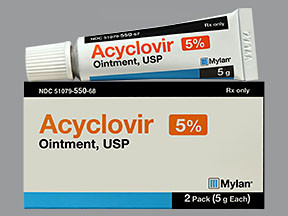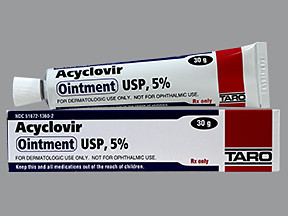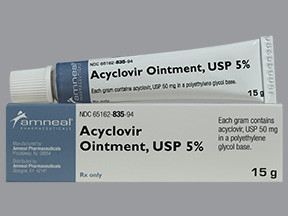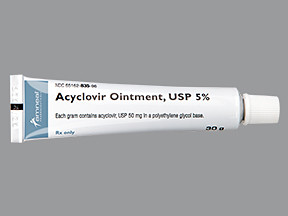ACYCLOVIR OINTMENT - TOPICAL
PHONETIC PRONUNCIATION: (ay-SYE-kloe-vir)
COMMON BRAND NAME(S): Zovirax
GENERIC NAME(S): acyclovir
Uses
USES: This medication is used to treat the first outbreak of genital herpes infection. It is also used to treat non-life-threatening herpes infections of the skin and around the mouth (cold sores) in people with a weakened immune system. This medication may decrease the length of time you have pain and help the sores heal faster. Acyclovir is an antiviral drug. It stops the growth of certain viruses. This medication does not cure herpes or prevent the infection from coming back. Also, it does not prevent the spread of herpes to others. Other antiviral medications taken by mouth may be more effective in treating these conditions. Discuss your treatment options with your doctor.
How to use ACYCLOVIR OINTMENT - TOPICAL
HOW TO USE: Apply this medication to skin only. Avoid getting this medication in your eyes. If this happens, wash right away with plenty of water. Begin using acyclovir as soon as symptoms of a herpes infection appear. Wash your hands with soap and water before and after using this medication. Clean and dry the affected areas before applying the medication. Use a finger cot or rubber glove when applying acyclovir to prevent spreading the infection to other parts of your body and to other people. Apply enough ointment to cover all sores, usually every 3 hours, 6 times a day, or as directed by your doctor. Continue to use this medication for the full time prescribed. Tell your doctor if your condition does not improve after 7 days of treatment or if it worsens.
Side Effects
Precautions
Interactions
Overdose
Images
Reviews
Faq for ACYCLOVIR OINTMENT - TOPICAL
- Acyclovir ointment is a medication used topically to treat the symptoms of herpes infections on the skin, lips, and genitals.
- Acyclovir ointment works by inhibiting the growth and spread of the herpes virus, thus reducing the severity and duration of outbreaks.
- Wash your hands before and after application. Apply a thin layer of the ointment to the affected area(s) and gently rub it in until it disappears. Use the ointment every 3 hours, 6 times a day for a period of 7 days.
- Acyclovir ointment cannot cure herpes, as it only helps in managing the symptoms and reducing the duration of outbreaks.
- Some common side effects may include mild pain or stinging at the application site. Serious allergic reactions are rare but possible. Contact your doctor if you experience any severe side effects.
- It is generally considered safe to use acyclovir ointment during pregnancy and while breastfeeding, but it's best to consult with your doctor before using any medication.
- Yes, acyclovir ointment is commonly used for treating cold sores (oral herpes) on the lips and face.
- If the ointment accidentally gets into your eyes, mouth, or nose, rinse thoroughly with water. If irritation persists, seek medical attention.
- Acyclovir ointment is specifically used for treating herpes infections and should not be used for other skin conditions. Consult your doctor for appropriate treatment options.
Disclaimer
IMPORTANT: HOW TO USE THIS INFORMATION: This is a summary and does NOT have all possible information about this product. This information does not assure that this product is safe, effective, or appropriate for you. This information is not individual medical advice and does not substitute for the advice of your health care professional. Always ask your health care professional for complete information about this product and your specific health needs.





No Reviews Yet